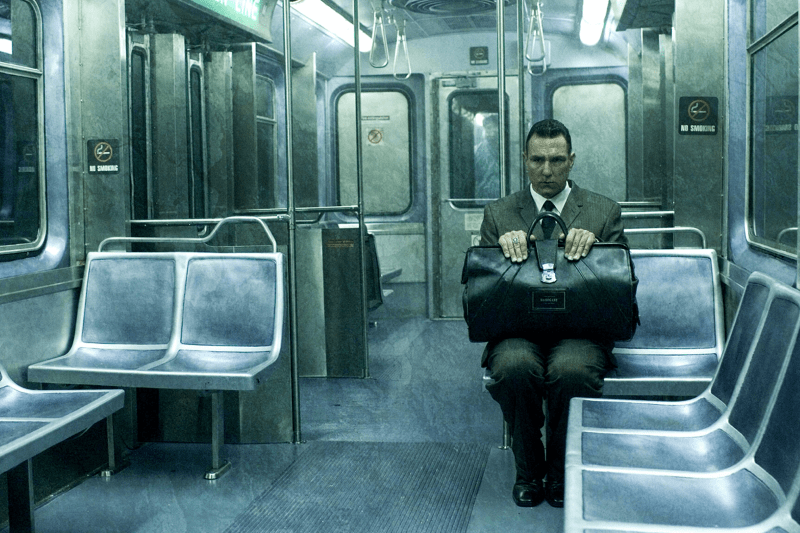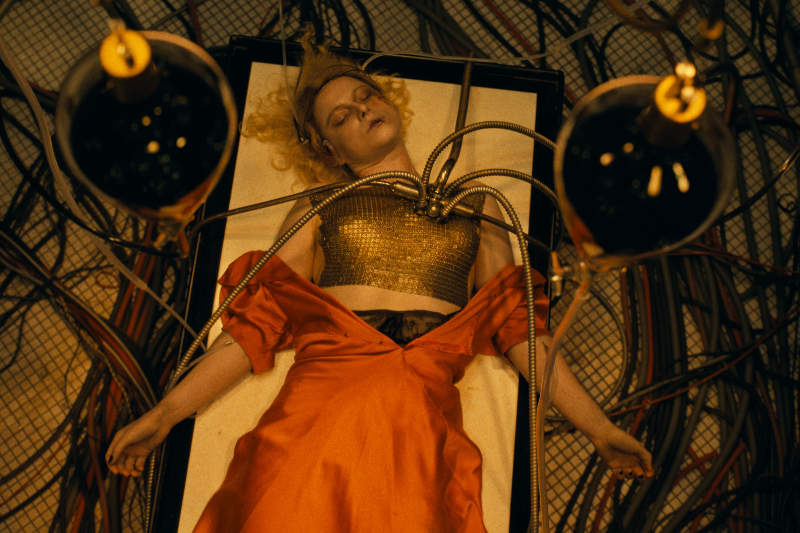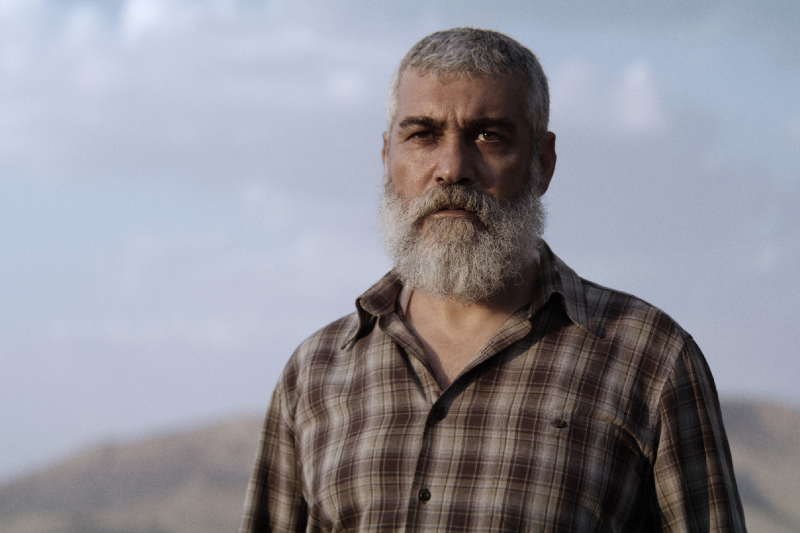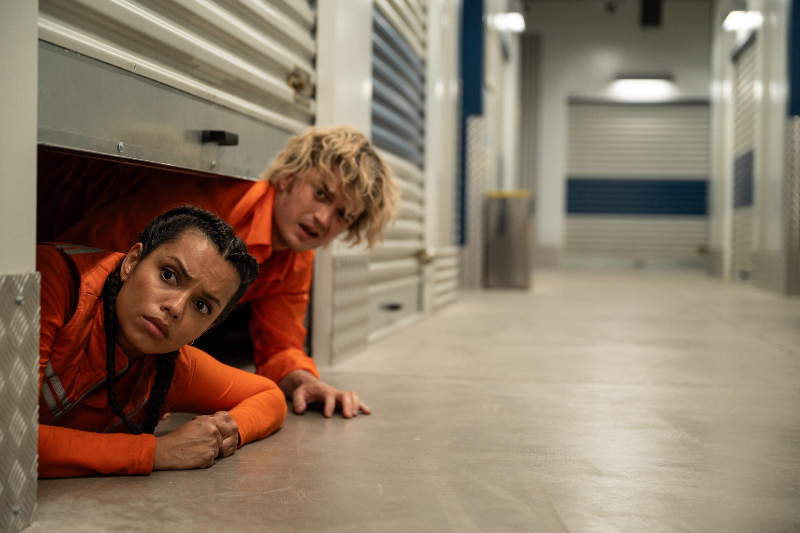Even as the political landscape has darkened this year, one theme has emerged from right-wing pundits and lawmakers alike: grown men are terrified of the subway. Still, let us give them the benefit of the doubt. When they close their eyes, perhaps they do not see subway cars as symbols of our shared humanity. Perhaps they just see them as the slaughterhouses of The Midnight Meat Train, Ryuhei Kitamura’s 2008 adaptation of Clive Barker’s short story. But while Kitamura’s film serves as a surprisingly faithful adaptation of Barker’s piece, it also fails its fascinating struggle to get New York City right onscreen.
Whether you’re familiar with the film or the short story, you can probably guess the general outline of the movie based on its title alone. In The Midnight Meat Train, a pre-fame Bradley Cooper plays Leon Kaufman, a struggling photographer who delves deeper and deeper into the underbelly of New York in search of the perfect photo. One night, he happens across Mahogany (Vinnie Jones), a scowling butcher who travels the subways at night in search of victims. It isn’t long before the two men begin a game of cat-and-mouse across the tunnels of Manhattan, traveling closer and closer to a secret that makes underground serial killers seem tame by comparison.
Despite a solid cast and its Clive Barker pedigree, you could be forgiven for skipping The Midnight Meat Train on its original release. Kitamura’s Hollywood debut was dumped in dollar theaters as the result of an acrimonious studio transition. At the same time, Kitamura’s film suffers from the same post-millenium flourishes as many Lionsgate releases. From sped-up dolly shots to flashes of white layered throughout the edit, The Midnight Meat Train sometimes feels like a feature-length adaptation of the MPAA’s infamous anti-piracy teaser. Compare this to a film like Lord of Illusions – the previous adaptation of Barker’s work, which he himself wrote and directed – and it's no wonder that the film remains outside of Barker's cinematic canon.
But with the benefit of hindsight, there are things worth celebrating in The Midnight Meat Train. The film embraces the cosmic horrors of Barker’s short and leans into the grotesquery always found in the author’s work (they’re called the Books of Blood for a reason, after all). The film even gets a lot right about the original story – but it gets a whole bunch wrong about New York, which goes from the beating, bloody heart of the novella to a black box staging of locationless horror.
To appreciate how central New York is to Barker’s story, you must first set aside the geographical issues of the film – that several of the train lines in The Midnight Meat Train are labeled as their Los Angeles counterparts, and that the subway cars seem lifted from another time and place entirely. There’s a vagueness to Kitamura’s New York that undercuts the eldritch terrors of Barker’s writing. In the film, New York is home to evil. In the story, New York itself is built atop the carcass of a great evil. It teeters above a great and nameless thing, and it is that sense of pervasiveness – that the city itself is wrong – that propels the story forward.
This disconnect is especially surprising given the timing. The film, released at the height of New York’s stop-and-frisk policies, does lean into the more autocratic elements in the novel. Every authority figure Kaufman encounters in his investigation runs the gamut between indifferent and corrupt. In an early scene, where Kaufman follows Mahogany to the subway station for the first time, Kaufman is pulled aside and manhandled by a local beat cop. The cop paws at his camera despite Kaufman’s half-hearted protestations. “Orange alert and above, I can search whatever I want,” he sneers. Unsurprisingly, when The Midnight Meat Train locates itself in post-9/11 New York, its unique vision of the city swims into focus.
But screenwriter Jeff Buhler’s New York lacks the perversion peppered throughout its source material. In Barker’s short story, the bloom is already off the rose for Kaufman and New York City. In the opening paragraphs, his character expresses fatigue at the prospect of waking up in the Big Apple every morning. He speaks of his past infatuation with great shame, and points to the undercurrent of violence that makes New York a place that “bred death, not pleasure.” If the Kaufman of the film is a photographer, then the Kaufman of the book missed his calling as a writer, penning his New York Magazine essay on leaving New York for an audience of one.
When Barker committed The Midnight Meat Train to paper, the city’s reputation was still synonymous with low-budget horror films directed by men like Bill Lustig. Buhler and Kitamura ably find horrors in back alleys and late-night subway cars, but the city itself is never implicated in these evils. When confronted with the notion of literal monsters in Barker’s book, on the other hand, the narrator tosses those imaginations aside in favor of a good old-fashioned civic hatred. “That excused the city: that left her off the hook,” Barker writes. “And Kaufman believed in his heart that the monsters to be found in the tunnels were perfectly human.”
It’s a cliche to say that New York is another character in a film, but cliches exist for a reason. Without the equal measures of frustration and obsession that drive Kaufman’s relationship to his home, so much of darkness of The Midnight Meat Train is left on the page. That doesn’t mean there’s not a lot to enjoy; the kinetic energy found in Kitamura’s Versus is on full display here, and Buhler’s script hews shockingly close to its source material. The film even dares for the downer ending, with Kaufman being tapped to continue the slaughter in the name of our elder gods. But if The Midnight Meat Train might work as a daring adaptation for most major American cities, it fails to capture the magic that makes New York the thing of nightmares.
One thing is for sure: while screenwriters might have turned to the Books of Blood for inspiration in the early 2000s, we are still overdue for Clive Barker’s moment in the sun. If Stephen King’s books can spawn dozens of films and half-again as many television shows, we are certainly living through enough of a society breakdown to support Barker’s apocalyptic visions on the screen. The Midnight Meat Train may be an imperfect adaptation of a seminal work of horror, but Barker leaves so many big ideas on the page that Buhler cannot help but craft something haunting. Let’s see if, in hindsight, The Midnight Meat Train was more of a station delay or a final exit.






